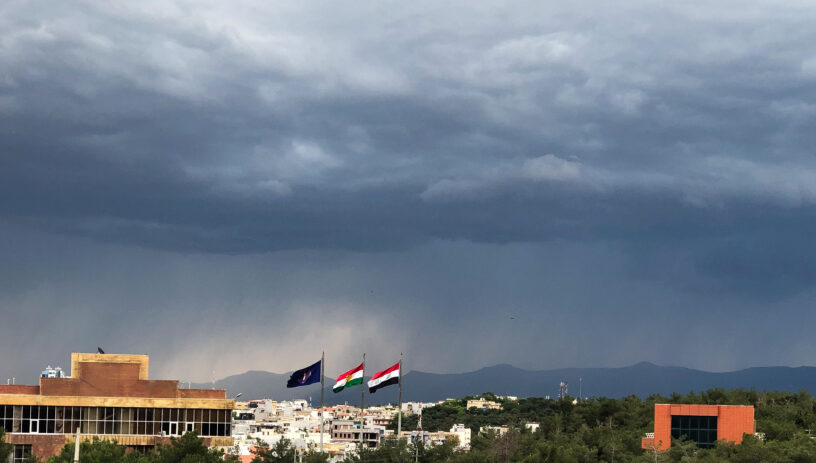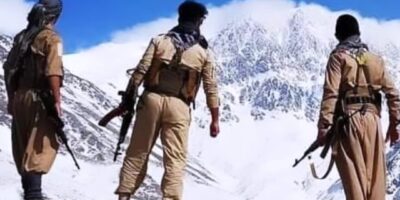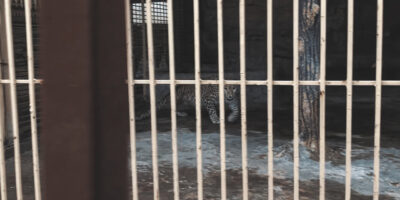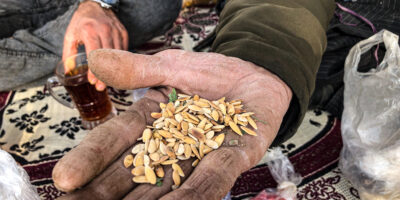SULAIMANI, Kurdistan Region – “Voting is futile.” “The outcome is predetermined.” “My vote doesn’t matter.” These are phrases heard again and again from voters about the Kurdistan Region’s upcoming parliamentary election.
The election has been delayed for two years. It is a delay that has been punctuated by heated political bickering, controversial federal court rulings, and comments from the international community about the sanctity of democracy. It is a hot button issue to everyone except voters, most of whom have little interest in casting a ballot.
“I think the apathy in Kurdistan runs very deep and it has been for some time,” said Shivan Fazil, a senior researcher at the Institute of Regional & International Studies (IRIS).
At the root of that apathy is a loss of faith in the two ruling parties – the Kurdistan Democratic Party (KDP) and the Patriotic Union of Kurdistan (PUK). There is a growing fatigue with the ruling parties, mainly due to a reversal in Kurdish fortunes and the standard of living.
“I would say it’s been for several years, the KDP and PUK are no longer seen as being able to advance the Kurdish cause or Kurdish interests, or even the livelihood of the Kurdish people,” Fazil explained.
For voters unhappy with KDP and PUK, however, there are not a lot of other options. Many political parties that style themselves as opposition do not actually offer much in the way of an alternative for discerning voters. They are frequently based on the same type of rule that the KDP and PUK have institutionalized.
The KDP and PUK have been in power since the first regional election in 1992. The two parties had been fierce rivals in the mountains, fighting bloody battles in the 1980s and ‘90s. But they soon realised they needed more than arms to compete at the ballot box. To do that, they fostered patronage networks, putting hundreds of thousands of people onto their payrolls in exchange for political loyalty.
The parties succeeded in raising the standard of living in an area that had been impoverished and underdeveloped for decades under the former Iraqi regime. During its golden decade after the fall of Saddam Hussein, Kurdistan Region was the most stable and economically vibrant part of Iraq, an island of prosperity and stability in a volatile region.
But when multiple troubles hit at once – a war with the Islamic State, low oil prices, budget disputes with Baghdad, the impact of climate change – the Kurdistan Regional Government (KRG) did not have the strong institutions needed to deal with them. With no social safety net in place, people saw their livelihoods disappear, their water taps run dry, and the electricity falter. Economic disparity has grown in the past decade. Public sector workers went for years not knowing if they would receive their salary each month. They scramble to put food on the table while the rich elite buy mansions in gated real estate developments with sales slogans like “Unlimited privileges for limited people.”
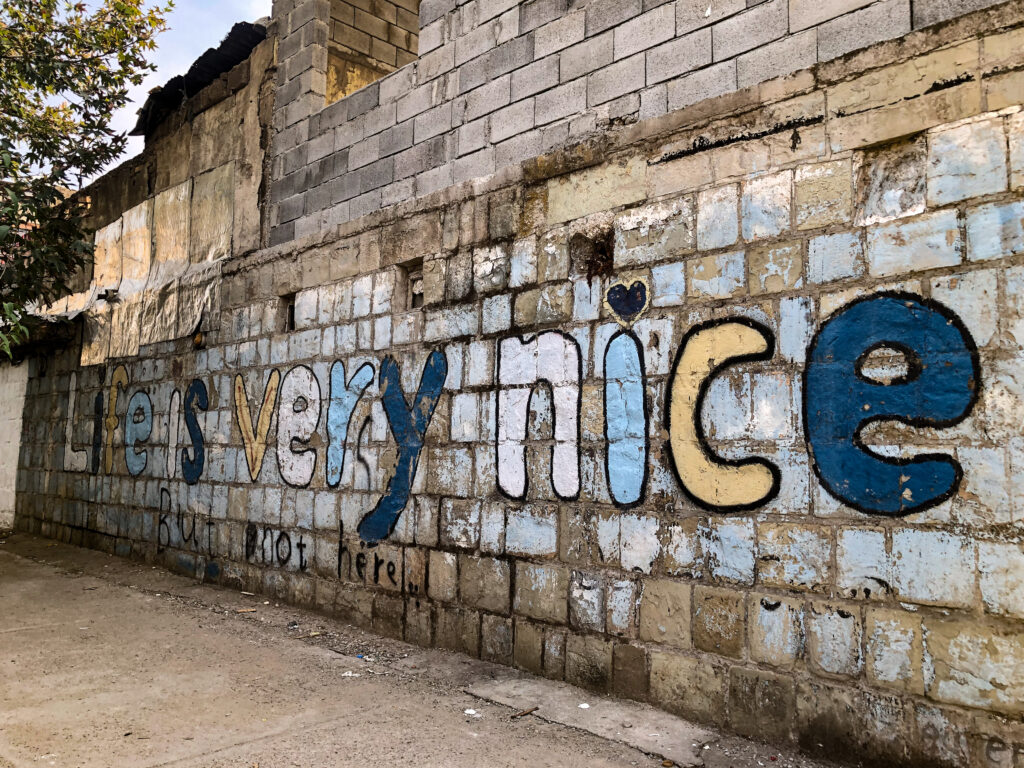
The KRG is now financially dependent on the federal government, as is its more-than-a-million-strong public sector workforce who are receiving their salaries from Baghdad. This alters the relationship between the public and the KDP and PUK.
“So I think people, for the first time, might no longer feel obliged to reward the ruling parties for their lots,” said Fazil.
The rise, fall, and rebirth of Gorran
Throughout the 32-year history of Kurdistan’s parliament, there has been just one party that has posed any real kind of opposition to the KDP-PUK duopoly, however briefly. That is the Gorran (Change) Movement.
The party stormed onto the scene in 2009. Just months after it was formed, it won 25 seats in an election, nearly a quarter of the parliament. Its message of deep reforms across politics and the economy resonated with voters.
Its founder, Nawshirwan Mustafa, joined the KDP at the tender age of 16, but left in 1975 with Jalal Talabani to form the PUK. Unhappy with centralization of power through family rule and rampant corruption in the KRG, of which the PUK was a critical part, Mustafa tried to institute reforms within the PUK. His efforts ultimately failed and he quit the party to establish his own.
The brand new Gorran launched itself into election campaigning using a song that called people to “Go to elections to improve life” that it played every night on its TV station KNN ahead of critiques of KDP and PUK leaders and promises. As a figure well-known for pushing for democratic reforms, Mustafa easily attracted support.
One of those who joined Gorran at the very beginning was Mohammed Ali Ahmad. He was living in the United Kingdom at the time and joined the party’s organization there before returning to the Kurdistan Region. The party’s anti-tribal structure, liberal attitude, and anti-corruption platform appealed to him.
“Gorran was claiming to reform every aspect of society, in terms of unification of the Peshmerga, fighting corruption. It was against intervention of political parties in the universities or education… and [advocating] for an unbiased or balanced relationship with Turkey and Iran,” he explained of his motivation for joining.
High on its 2009 electoral win, Gorran took the hopes of its supporters to parliament, where it filled the role of opposition and made the legislature relevant to the general public for the first time in its history.
“Before the Gorran Movement, the Kurdistan parliament only served one role, and that was rubber-stamping government laws. It ignored its other roles. After the entry of the Movement into parliament, it became markedly more relevant to the Kurdistan Region’s politics,” Hawre Hasan Hama, a lecturer in international relations and politics at University of Sulaimani, wrote in 2020.
This parliament is the only one that ever debated a budget, opening government spending to some public inspection and accountability for the first and only time.
In the 2013 election, Gorran again did well, securing 24 seats to remain the second-largest party and hold the position of parliament speaker. Gorran had vowed that it would fix the ills of the government and there was increasing pressure from its base to deliver. The party appears to have realised that they could not change anything while sat in the shadows as opposition. The mounting pressure meant that the leadership council made the controversial decision to join the KDP and PUK in a power-sharing government, the first in a string of decisions that drove supporters away. The party held the ministries of finance, religious affairs, Peshmerga, and investment and trade.
Within two years, this cooperation went up in flames. KDP and Gorran disagreed on amendments to the presidency law. Gorran wanted the president elected by the parliament while the KDP wanted it to be a general vote. Tensions were high, and after KDP offices were damaged by protesters in Sulaimani, then-prime minister Nechirvan Barzani sacked the Gorran ministers in his cabinet and the parliament speaker was barred from entering Erbil. It would be two years before parliament sat again.
In 2016, Gorran made another controversial decision. It signed a pact with the PUK, declaring their shared commitments to a parliamentary system, decentralization of power, and Peshmerga reforms. This return to the party that they had rejected angered many supporters of Gorran, who thought it was selling out.
On May 19, 2017, Nawshirwan Mustafa died after a lengthy illness. In his will, he left Gorran’s real estate holdings, and therefore its finances, in the hands of his sons. This decision, seen as cementing family rule in the party that was founded to reject such nepotism, further alienated supporters.
“Gorran Movement was claiming a lot of things in the beginning and it was based on many principles, but by the end of 2017 and ‘18… they gave up most of those principles by joining the government and the sons of Nawshirwan Mustafa controlling or monopolizing the media and finances and the main headquarters of the Gorran Movement. I think they compromised and they left most of the principles and ideas of the Gorran Movement,” said Ahmad.
After many years of vital work for Gorran, including drafting policies within its political research chamber, Ahmad quit the party in 2018.
In the election that same year, voters made their displeasure with Gorran clear. The party lost half its seats in the Kurdistan Region parliament. In the most recent election for the federal parliament in 2021, Gorran was shut out entirely, unable to win a single seat.
“We apologize to the Gorran Movement voters and we bear responsibility for the mistakes and shortcomings… for losing the trust of people,” the party said in a statement to the public after its election failure. It pledged to conduct a comprehensive review of the party and its policies.
Gorran is now hoping to make a comeback by returning to its roots.
“I could say, very simply, the results of all the elections that have happened since 2009 tell us everything,” said Munira Osman, a member of Gorran.
The party lost votes when it joined government and it would be “suicidal” to repeat that, and its pact with the PUK was “a fatal mistake” that it will not make again, she said.
Osman began her political career in the PUK where she worked with Nawshirwan Mustafa in his reform efforts. She left the PUK with him and was one of the founding members of Gorran. She was first elected to the parliament in 2013.
Central to Gorran’s rebirth is building a stronger relationship with the public. “We knew that we had no power, no money, so what we had to work with was just the people. We only had people and nothing else,” said Osman.
The party is bringing in a lot of new faces, people who are publicly known and loved. Many of the new members are women and Osman said they have approached a woman to lead the party and are working on convincing her to take the job. If successful, this would be the first political party in Iraq with a woman in the top spot.
They have also restructured the party so that ideas and policies flow from the ground up. Instead of a vertical, top-down decision-making process, it is now a horizontal one, Osman said.
With these changes, Gorran hopes they can regain the trust of voters, but they acknowledge it will take time.
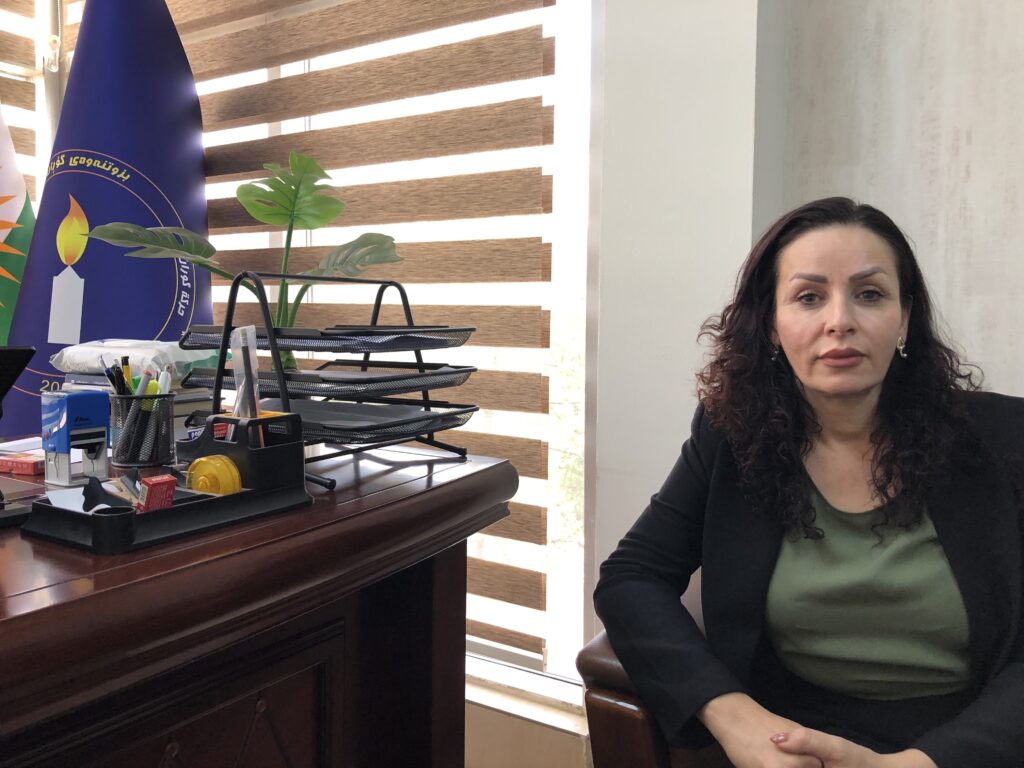
“We know that this is the first step…” said Osman. “We’ll get better than before and then step-by-step we will make other steps and we will do what we have to do to make it better. We’re not expecting that we get everything the first time.”
“I am very hopeful that we will again become a very good opposition party,” she added.
Could Gorran make a comeback? To Osman, “Nothing is impossible in politics.”
Political pundits are more pessimistic.
“That’s impossible,” said Sardar Aziz, an analyst and former advisor to the Kurdistan parliament. He thinks the party’s vision and hope are gone, exacerbated by the passing of its magnetic leader.
“Above all, Gorran was a movement based on the power of charisma,” Aziz said. “There was the charisma of Nawshirwan Mustafa at the centre. One of the problems of charisma is it will never get replaced or repeated.”
Mera Bakr, a non-resident fellow at IRIS, said that Gorran is “doomed to fail” because the finances are controlled by the sons of Nawshirwan Mustafa.
Gorran’s competition
When voters finally go to the polls in October, there will be some new parties led by familiar faces. Analysts, however, expect they will not attract enough votes to get more than a couple of seats, because their offerings are insubstantial.
Lahur Talabany was forced out of the PUK by his cousins and went on to establish the People’s Front. He is courting voters who are unhappy with the KDP and PUK. Ali Hama Salih is a well known politician who quit Gorran and set up his own party – Halwest, or the National Stance Movement – that is very critical of the ruling parties. Adham Barzani, a cousin of KDP leader Masoud Barzani who is on less than good terms with the politically powerful members of his family, has also established his own party.
This election will be the first time these three parties face voters.
New Generation has been around for several election cycles and it is the strongest of the opposition parties. It was established by Sulaimani businessman Shaswar Abdulwahid in time for the 2018 election. The party has wide reach, thanks to its wealth and TV station, but attracts more protest votes than supporters, according to Sardar Aziz.
“The people who are voting for them, they are not voting for them because of who they are, they are voting for them in opposition to the PUK and KDP,” said Aziz.
None of these parties are able to provide a viable alternative to the KDP and PUK. They are “absolutely the opposite of healthy,” according to Bakr.
All of them have been established based on the personality of the leader and lack an internal, democratic structure. They spend a lot of energy criticizing the KDP and PUK and then make populist promises that may be what people want to hear, but that ultimately are naive.
“They say vote for me and tomorrow I will turn the Kurdistan Region into Switzerland,” said Bakr. “Opposition parties have been extremely untruthful with the people.”
Aziz blamed Gorran for the culture that has developed around opposition politics of an unrealistic expectation that reforms will move at a breakneck speed instead of the piecemeal efforts of gathering votes, working in the parliament, and changing laws.
“Gorran raised expectations. People expect different opposition, a radical big power to come in and make change in many ways – to eliminate corruption, to bring transparency, to have fair distribution of wealth, and opening up the government,” he said.
Getting out the vote
The election is set for October 20. Turnout has been declining with every election, but predictions vary on what will happen this time.
It is a crucial vote for the two ruling parties who are facing an unhappy electorate after years of austerity and financial hardships. Even so, both parties have very loyal constituencies who will show their support on election day.
“This election is quite consequential for the KDP and PUK… It’s time for them to renew their legitimacy and to make sure that their dominance will remain,” said Mera Bakr. “That means in this election KDP and PUK will do everything literally possible in their power to make sure that everyone who has slightly fallen under their umbrella of patronage would go and vote.”
The number of new parties that will be on the ballot paper and the competition between them is evidence that the political scene is lively, and with so many parties crowding the field, especially in Sulaimani, this may also encourage more voter participation.
But as long as the opposition does not offer enough to stir the people to action and people outside of the party faithful feel that their vote will not bring about change to the status quo, then there will likely be a large segment of the population who will choose to not come out and vote.
“There is disenchantment, a universal disenchantment,” said Sardar Aziz.

